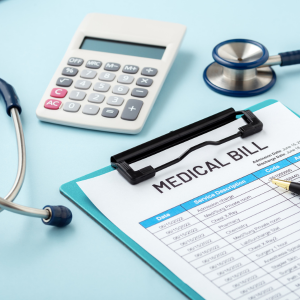
Medical debt is one of the primary sources of financial difficulty for individuals and families across the country, and the stakes in Chicago, Illinois, can be exceptionally high. Many homeowners are astonished to learn that unpaid medical bills can result in aggressive collection procedures, such as liens on their property. If left unaddressed, these debts might jeopardize your home. Understanding how this process works, your rights as a homeowner, and how to avoid losing your property is critical when dealing with medical debt in Illinois.
Understanding Medical Debt and Home Ownership Risks in Illinois
Medical debt can profoundly affect your ability to own a home in Illinois, especially in urban areas like Chicago, where high property values and living expenses add to the financial strain. Accumulating unpaid medical expenses can adversely affect your credit report, which lenders examine meticulously during the mortgage application process.
Medical debt can lead to lower credit scores, higher interest rates, or even disqualification from house loans. In Illinois, recognizing your medical debt rights is critical; state laws provide certain protections, but many citizens are ignorant.
For instance, specific debts may be contested or negotiated to avert collection agencies from initiating legal proceedings that could further endanger financial stability. Furthermore, liens may be imposed on property due to unpaid medical costs, jeopardizing house ownership opportunities.
To effectively manage medical debt and protect their dream of homeownership, prospective buyers in Chicago must educate themselves on how this debt can impact their goals and explore the resources available to them, and A Team Real Estate Solutions can help.
The Role of Health Insurance in Protecting Assets From Medical Bills
Health insurance is essential for Chicago homeowners, as it protects their assets from the financial burden of medical expenses. It functions as a financial safeguard, preventing the escalation out of control of medical debt and the threat to home ownership.

By covering a significant portion of healthcare costs, health insurance reduces the likelihood that individuals will need to dip into savings or sell assets like their homes to pay off medical expenses. Maintaining home equity is vital for financial stability in Chicago, where housing prices can be high.
If you don’t have enough health insurance, unforeseen medical problems could cost you a lot out of your pocket, making it harder to keep up with your mortgage payments or possibly leading to foreclosure. Understanding the terms and coverage of your health insurance policy is vital for managing future medical bills properly.
Homeowners should ensure they are adequately covered to protect their property from being compromised due to unforeseen healthcare expenses.
How Medical Liens Work on Property in Chicago, Illinois
In Chicago, Illinois, medical debt can significantly impact house ownership by putting medical liens on property. Healthcare providers or hospitals may seek a lien against an individual’s property to recoup unpaid medical expenses.
This process begins when a creditor files the lien with the county recorder’s office, gaining an interest in the debtor’s real estate. A medical lien can complicate selling or refinancing a home because the homeowner must satisfy it before completing the transaction.
Homeowners in Chicago encountering this circumstance should recognize that state laws offer specific rights and procedures for contesting or settling these debts. Comprehending one’s rights and alternatives is essential, as Illinois law mandates that any lien must be duly registered and reported to establish its legitimacy.
Securing legal or financial guidance can help navigate these challenges and potentially lead to reduced settlements or manageable payment plans, protecting one’s homeownership status in Chicago. Contact A Team Real Estate Solutions for assistance.
Legal Protections Against Medical Debt Seizure in Chicago
In Chicago, legal protections safeguard homeowners from losing their property due to medical debt. Illinois law provides a homestead exemption to shield a certain amount of home equity from creditors, including those pursuing medical debt collections.
Lawmakers enacted this provision to prevent the forced sale of your primary dwelling in certain circumstances, providing important security for homeowners facing financial troubles. Furthermore, federal restrictions such as the Fair Debt Collection Practices Act (FDCPA) provide additional protection by limiting how debt collectors can pursue outstanding medical payments and prohibiting harassment or deceptive techniques.
Chicago homeowners need to understand these rights and the legal recourse available to them, such as negotiating payment plans or seeking advice from consumer protection agencies. By being informed about these legal defenses, residents can better navigate the challenges of medical debt while maintaining ownership of their homes.
State Laws Governing Property Seizure for Unpaid Medical Bills in Illinois
For Illinois homeowners struggling with medical debt, it is essential to comprehend how state rules control the seizure of property for unpaid medical bills. State-specific rules can significantly impact results, even while federal laws offer some protection.

In Illinois, homestead exemption laws protect a certain amount of a home’s equity from creditors, including those seeking repayment for medical debts. Specifically, the Illinois Homestead Exemption allows homeowners to exempt up to $15,000 of their property’s value if single or up to $30,000 if owned jointly by a married couple.
This implies that, while creditors can pursue unpaid medical expenses through legal procedures, their ability to force the sale of your property is limited due to these protections. Furthermore, Illinois law requires creditors to secure a court judgment before seizing property.
People who own homes in Chicago and the rest of Illinois should know about these rights and talk to a lawyer if they are being aggressively collected on medical debt. Knowing your rights under Illinois law can help you deal with the complicated process of collecting on medical debt and protect your home from being taken without a good reason.
Understanding Homestead Exemptions and Property Protection in Illinois
If you live in Illinois and have medical debt, it’s essential to understand homestead exemptions, especially if you live in Chicago. Under its homestead exemption rules, the state offers protections to keep some of the equity in your primary home secure from creditors.
As long as the value of your home does not exceed the exemption level, which is now $15,000 for individuals and $30,000 for married couples filing jointly, creditors will not be able to force the sale of your home, even if you have unpaid medical debt. By avoiding forced property sales brought on by unsecured debts like medical expenses, these safeguards are intended to give homeowners a safety net.
It is important to note that while these exemptions offer some protection against certain types of creditors, they do not apply to mortgage lenders or tax authorities. Understanding these nuances can help individuals in Chicago navigate the complexities of debt management while preserving home ownership rights amidst financial challenges caused by medical expenses.
Impact of Unpaid Medical Bills on Credit Scores in Illinois
Unpaid medical bills can substantially influence your credit score, especially in Illinois, where financial institutions record debt according to specific state requirements. Unpaid medical debt on credit records is common in Chicago and throughout Illinois.
This bad record might hurt your credit score, which makes it harder to get good conditions when you want to buy a property. Lenders in Chicago look closely at credit histories. If you have a bad credit score because of medical debt, you may have to pay higher interest rates or be turned down for a mortgage.
Potential homeowners must understand that while Illinois law requires a 180-day grace period before medical debt is reported on credit files, once it does appear, its impact can be substantial and long-lasting. Ensuring timely payment or negotiating with healthcare providers can help mitigate these effects.
Understanding how these financial factors fit into the broader process of buying a home in Chicago empowers residents to manage their finances proactively and protect their homeownership dreams from being disrupted by unpaid medical bills. We buy houses, helping you sell your Chicago house faster and properties in other cities across Illinois.
Negotiating Medical Bills: Strategies for Illinois Residents
Negotiating medical bills is a crucial strategy for Illinois residents seeking to protect their home ownership from the adverse effects of medical debt. Understanding your rights and options is essential in Chicago, where healthcare costs can be exceptionally high.
Discrepancies are prevalent and can considerably increase the amount owed. Therefore, residents should review all medical bills for errors or unnecessary charges. Another effective strategy is engaging with healthcare providers to discuss payment plans or prospective discounts.
Many hospitals and clinics in Illinois have programs that help people who have to pay a lot of medical bills. Illinois laws also give customers several protections that make it easier for them to deal with collection agencies. For example, these firms must prove that debts are valid before they may collect them.
By aggressively managing outstanding medical expenses and leveraging available resources, Chicago homeowners can reduce the risk of incurring debt that may threaten their property ownership. Utilizing credit counseling programs tailored to Illinois can offer essential assistance in controlling medical debt and ensuring financial stability.
Exploring Payment Plans and Settlements with Healthcare Providers
When dealing with medical debt in Chicago, understanding your options for payment plans and settlements with healthcare providers is crucial for protecting your home ownership. Many hospitals and clinics offer flexible payment plans tailored to fit your financial situation, allowing you to manage medical expenses without the immediate threat of losing your home.
It’s important to communicate openly with healthcare providers about your financial circumstances, as they may be willing to negotiate a settlement that reduces the total amount owed. By exploring these options, you can potentially avoid having unpaid medical bills turn into liens against your property, which could jeopardize your ability to maintain home ownership in Chicago.
Knowing local medical debt laws and consumer rights can empower you during discussions, ensuring fair and manageable arrangements. Work with healthcare organizations to reduce medical debt and protect your home, your most precious possession. If you need to sell quickly, remember that we buy houses in Oak Lawn and nearby cities in Illinois to make the process easier for you.
The Process of Disputing Incorrect or Inflated Medical Charges
Disputing incorrect or inflated medical charges is essential in protecting your financial health and preserving your home ownership potential in Chicago. First, request detailed billing statements from healthcare providers to identify discrepancies or errors.
It is essential to juxtapose these invoices with insurance explanations of benefits to identify discrepancies. If you observe discrepancies, contact the healthcare facility’s billing department to resolve them. They may be amenable to rectifying errors or providing payment arrangements.
If the dispute cannot be satisfactorily resolved, it is recommended that you submit a formal complaint to your insurance company, along with all pertinent documentation and correspondence. In Illinois, consumers are entitled to protections under state laws that safeguard against unfair practices in medical invoicing. Therefore, comprehending these laws can bolster your negotiating position.
Engaging with a credit counselor or legal expert specializing in medical debt can provide additional support and guidance through this process, ensuring that inaccuracies do not unjustly affect your credit score or hinder your ability to maintain homeownership.
What Happens If I Don’t Pay Medical Bills in Illinois?
If you don’t pay your medical bills in Illinois, including in Chicago, you could lose your house and financial security. If you don’t pay your medical bills, healthcare providers or collection agencies may tell credit bureaus about the debt, which could hurt your credit score.
In Illinois, creditors can take legal action to recover outstanding medical debts, which may result in wage garnishment or a lien on your property. A lien may hinder the process of selling or refinancing your home.
Chicago homeowners must understand their rights when dealing with medical debt. The Illinois Collection Agency Act provides certain protections against aggressive debt collection practices.
The Fair Debt Collection Practices Act allows you to dispute erroneous medical debt information on your credit report. Exploring options such as establishing a payment plan with healthcare providers or finding financial aid organizations can help you reduce the impact of medical debt and maintain your Chicago home ownership status.
Can You Lose Your House Due to Medical Bills?
Medical debt can make it very hard to keep your home, especially in a city like Chicago, where housing expenses are high. Medical bills can’t immediately make you lose your house, but they can start a chain of financial problems that could make it hard to pay your mortgage.

In Chicago, if unpaid medical debts are sent to collections, it could result in a lower credit score. A reduced credit score can increase the interest rates on loans or make refinancing more difficult, putting additional strain on your finances.
Furthermore, if you miss mortgage payments while struggling with medical debt, foreclosure could become a very real possibility. Homeowners in Chicago must understand their rights and explore options such as negotiating payment plans with healthcare providers or seeking assistance from local non-profit organizations that offer support for those facing overwhelming medical expenses.
By taking proactive steps and being informed about legal protections against aggressive debt collection practices, you can better safeguard your home from the ripple effects of mounting medical bills.
How Do I Protect My House From Medical Debt?
Protecting your home from the impacts of medical debt in Chicago is crucial for safeguarding your financial stability and maintaining home ownership. Understanding your rights is the first step in this process.
Familiarize yourself with Illinois’ Homestead Exemption, which can shield a portion of your home’s value from creditors. It’s important to know that while medical debt can lead to significant financial strain, it doesn’t automatically result in losing your home.
Stay proactive by negotiating payment plans with healthcare providers and seeking assistance from local non-profit organizations specializing in medical debt relief. Additionally, consulting a knowledgeable attorney who understands Chicago’s specific laws regarding debt protection can provide personalized strategies to help protect your property.
Consider consolidating debts or exploring bankruptcy options as a last resort to manage overwhelming obligations without sacrificing home ownership. Being informed about these protections and resources empowers you to effectively navigate the challenges of medical debt while securing your residence in Chicago.
Thinking about selling or have questions? Give us a call at (708) 608-0420 for a no-obligation offer. Start the process today!
| INPATIENT | OUTPATIENT | UNINSURED | ILLINOISANS | STATE OF ILLINOIS | HEALTH CARE |
| LAWYERS | UNINSURED | PUBLIC HEALTH INSURANCE | UNDUE MEDICAL DEBT | INCOME | IMMIGRANT |
| EMAILS | DEDUCTIBLE | DEBT FORGIVENESS | MEDICAID | HEALTH CARE PROFESSIONALS | HEALTH CARE PROVIDERS |
| HEALTHCARE PROFESSIONALS | COOK COUNTY | MEDICARE PLANS | COPAYMENTS | TELEPHONE NUMBER | TELEPHONE NUMBER |
| TELEPHONE | LOW-INCOME | POVERTY | DOCTOR | PHYSICIANS | NONPROFIT |
| NONPROFIT ORGANIZATION | ILLINOIS GENERAL ASSEMBLY | ILLINOIS ATTORNEY GENERAL | ATTORNEY GENERAL | PRECKWINKLE | TONI PRECKWINKLE |
| LAWSUIT | LANGUAGE | ILLINOIS DEPARTMENT OF HEALTHCARE AND FAMILY SERVICES | ILLINOIS DEPARTMENT OF HEALTHCARE AND FAMILY SERVICES | FORGIVENESS | EMPLOYEE |
| EMAIL ADDRESS | 501(C)(3) NONPROFIT | 501(C)(3) NONPROFIT ORGANIZATION |
